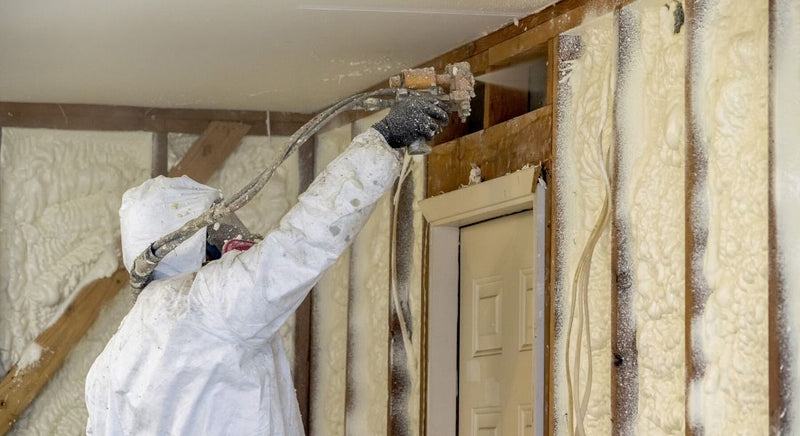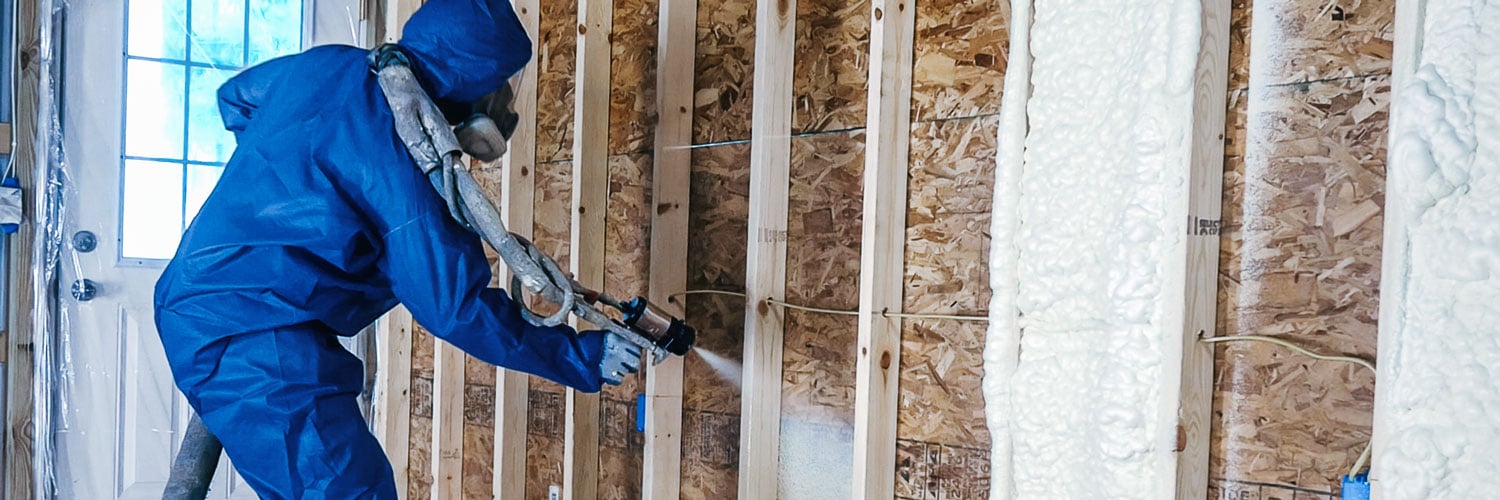Understanding the Benefits of Using Spray Foam for Insulation Projects
Understanding the Benefits of Using Spray Foam for Insulation Projects
Blog Article
Spray Foam: The Ultimate Remedy for Air Sealing and Insulation
Spray foam insulation has actually become a leading option for reliable air sealing and thermal insulation, supplying a special combination of residential or commercial properties that establish it in addition to typical techniques. Its ability to expand and fill up voids makes it particularly effective in avoiding air leakage, which can significantly influence power effectiveness. Recognizing the full range of its advantages, installation processes, and comparisons with other insulation kinds is crucial for making educated choices. As we check out these facets, the implications for both new buildings and retrofits become increasingly significant. What variables should influence your option?
What Is Spray Foam?
Spray foam is a functional insulation product that integrates the concepts of air sealing and thermal resistance to boost energy efficiency in buildings. Composed primarily of polyurethane or various other comparable substances, spray foam is applied as a fluid that broadens upon contact with surface areas, creating a strong, constant layer of insulation. This special residential or commercial property permits it to fill spaces, cracks, and gaps that standard insulation materials may forget, providing a remarkable air seal.
There are 2 major kinds of spray foam: open-cell and closed-cell. Open-cell spray foam is lighter and a lot more adaptable, using outstanding noise absorption and a reduced R-value per inch - Spray Foam. On the other hand, closed-cell spray foam is denser, supplying a higher R-value, wetness resistance, and added architectural integrity to building components
The application procedure commonly entails customized tools, making certain a smooth application that follows numerous substratums, including timber, metal, and concrete. This adaptability makes spray foam appropriate for both brand-new constructions and retrofitting existing structures. Its ability to create an airtight obstacle dramatically contributes to lowering energy intake and improving indoor air top quality, consequently making it a preferred choice amongst home owners and building contractors alike.
Advantages of Spray Foam Insulation
One of the most substantial advantages of spray foam insulation is its remarkable capacity to produce a continuous air obstacle, which efficiently lessens power loss. Unlike conventional insulation materials, spray foam broadens to fill up gaps and fractures, making sure that air leakage is drastically decreased. This particular not only enhances energy performance however also results in reduce energy costs with time.
Additionally, spray foam insulation offers superior thermal resistance, adding to a much more secure indoor setting. Its high R-value per inch permits reliable insulation in constrained spaces, making it optimal for attics, walls, and crawl areas. Moreover, the moisture-resistant homes of spray foam assistance avoid mold and mildew development, advertising much healthier living conditions.
One more critical benefit of spray foam insulation is its sound-dampening qualities (Spray Foam). It successfully minimizes noise transmission between areas, developing a quieter and much more comfy home atmosphere. The longevity of spray foam likewise stands out, as it does not sag or settle in time, preserving its efficiency throughout its lifespan
How Spray Foam Works
Understanding just how spray foam insulation works is vital for appreciating its effectiveness in air securing and thermal resistance. Spray foam insulation is composed of two primary parts: isocyanate and polyol material. When these elements are combined, they go through a chain reaction that triggers the product to expand quickly, producing a dense foam that fills up gaps, fractures, and cavities.
As the foam broadens, it abides by surface areas, creating an impermeable seal that substantially decreases air infiltration. This particular makes spray foam insulation highly reliable at avoiding drafts and dampness infiltration, which can lead to power loss and damage in time. Additionally, the closed-cell version of spray foam uses premium thermal resistance due to its stiff structure, properly lessening heat transfer.
The distinct homes of spray foam enable it to satisfy irregular surface areas, making sure comprehensive protection and a smooth obstacle. Therefore, spray foam insulation not just improves power efficiency yet also adds to enhanced indoor air quality by reducing the accumulation of allergens and pollutants. Inevitably, comprehending the mechanics behind spray foam highlights its role as an exceptional choice for insulation and air securing in both commercial and household applications.
Setup Refine Review

Before installation, the room Going Here needs to be properly cleaned and prepped, making sure that surface areas are cost-free from dust, moisture, and particles. This step is essential because pollutants can endanger bond and overall efficiency. Once the area is prepared, the application includes mixing both parts of the spray foam, which expands upon contact and fills up voids effectively.
Educated specialists ought to perform the setup, making use of customized devices to guarantee consistent insurance coverage and ideal density. Security safety measures, consisting of putting on safety anonymous equipment and guaranteeing appropriate air flow, are imperative during this process. After application, the foam commonly cures quickly, developing a strong obstacle that boosts energy efficiency.
Contrasting Spray Foam to Conventional Insulation
When assessing insulation choices, spray foam insulation stands out in comparison to traditional products such as fiberglass and cellulose. Unlike fiberglass and cellulose, which can enable air infiltration, spray foam increases upon application, filling crevices and gaps to create an airtight seal.
Furthermore, spray foam gives a higher R-value per inch than typical insulation types, providing more reliable thermal resistance in a thinner profile. This characteristic is particularly beneficial in spaces with restricted dental caries deepness. Moreover, spray foam is immune to dampness and mold and mildew development, which can be a considerable worry about cellulose and fiberglass, especially in humid settings.
However, spray foam insulation normally lugs a higher ahead of time cost than learn the facts here now its standard counterparts. Homeowners must weigh this preliminary investment versus long-term power cost savings and performance advantages. Eventually, while both insulation types offer their objective, spray foam becomes an advanced remedy for modern insulation needs, particularly in regards to air securing and thermal effectiveness.

Verdict
In recap, spray foam insulation represents a very effective service for achieving ideal air securing and thermal resistance. Its one-of-a-kind residential or commercial properties, including moisture resistance and noise dampening, make it suitable for different applications in both brand-new building and constructions and retrofitting projects (Spray Foam). The first prices might be greater contrasted to typical insulation products, the lasting advantages, such as significant power savings and improved interior air high quality, validate the investment and underscore its worth in modern building methods.
Spray foam insulation has actually arised as a leading service for efficient air sealing and thermal insulation, supplying a special combination of homes that set it apart from standard methods.Spray foam is a functional insulation product that combines the principles of air sealing and thermal resistance to boost power performance in structures.When assessing insulation alternatives, spray foam insulation stands out in comparison to traditional products such as fiberglass and cellulose. Inevitably, while both insulation kinds serve their function, spray foam arises as an extra sophisticated service for modern-day insulation needs, specifically in terms of air sealing and thermal effectiveness.
In summary, spray foam insulation represents a highly reliable remedy for attaining optimal air securing and thermal resistance.
Report this page